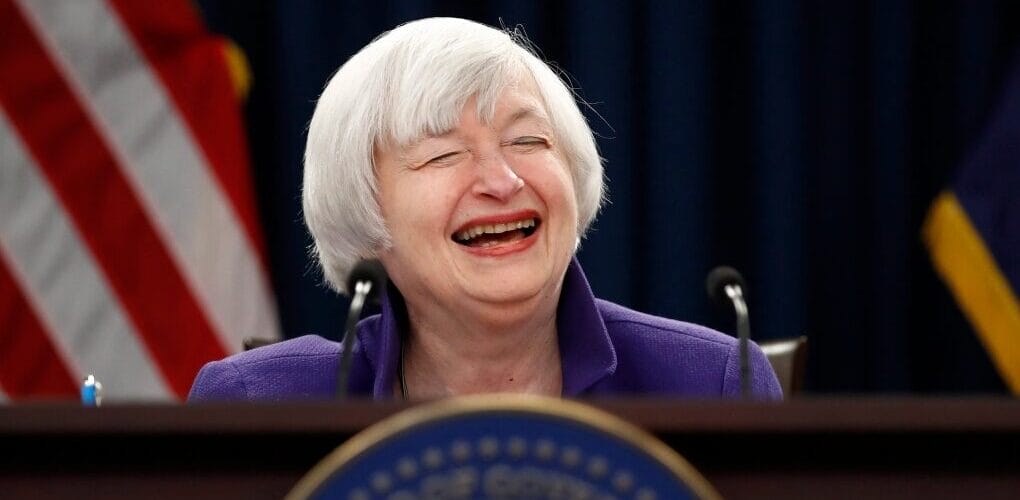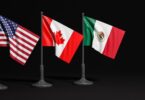The following report is by Yahoo! Finance:
The initiative is part of the first-ever strategy by the Treasury Department to increase access to the financial system for Americans, as requested by Congress in 2023.
“For the first time, Treasury’s strategy provides a national roadmap to expand access to foundational financial tools like credit and investments that are key to building wealth,” Yellen said. “Implementing these recommendations will help more families build financial security and get ahead.”
First on her list of objectives embedded in a 35-page “national strategy for financial inclusion in the United States” is finding more ways for governments and financial institutions to encourage people to open transaction accounts at banks backstopped by federal deposit insurance. It’s a strategy designed to reduce the number of “unbanked.”
An estimated nearly 6 million US households did not have a bank account at a bank or credit union, according to the most recent 2021 Federal Deposit Insurance Corporation national survey of unbanked and underbanked households.
Bank account ownership varies significantly by household demographic, including, race, income, and gender.
While just 2.1% of white households lacked a bank account in 2021, 11.3% of Black households, 9.3% of Hispanic households, and 6.9% of American Indian or Alaska native households lacked an account, according to the FDIC survey.
Treasury is proposing that the federal government work with local governments to encourage people to open accounts when they get new jobs, a government payment, or a tax refund.
When the federal government issued payments to consumers during the pandemic, those without bank account information with the IRS, including some of the most economically vulnerable, had to wait for the arrival of a paper check rather than a faster and more secure direct deposit.
Treasury is also asking banks to expand the availability of bank accounts that are affordable and tailored to meet the needs of underserved communities — avoiding high fees, overdraft charges, and minimum balance requirements.
One example cited by Yellen is the Reading Cooperative Bank in Massachusetts, led by former American Banker Association chair Julie Thurlow.
It has opened a new branch staffed with bilingual bankers in an immigrant community in Lawrence, Mass., providing loans to finance housing redevelopment and new financial products.
The biggest bank in the US, JPMorgan Chase, also recently announced it is opening nearly 100 new branches in low-income areas around the country, including America’s inner cities and rural towns.
Treasury’s plan released Tuesday also suggests ways to get people who have no or limited credit history to be able to borrow money.
Treasury recommends banks, consumer reporting agencies, and the government all work together to use alternative ways to show that a prospective borrower would repay loans on time by using utility payment history and bank account cash flow to help conjure a credit score so more can gain access to borrowing.
Another action item identified by Treasury Tuesday is to increase retirement and emergency savings opportunities. It stresses the importance of educating Americans on how to save for retirement and having employers be the bridge for that.
Employers, according to the Treasury, should offer incentives for saving and expanding access to retirement saving accounts — as well as tools that make it easier for people to access emergency savings to better manage short-term financial shocks without jeopardizing their long-term retirement goals.
Overall, the report underscores the importance of financial education and the need for plain-language product disclosures, information about consumer rights, and recourse options.
Treasury acknowledges that for this strategy to be successful it depends on active participation by banks, governments and employers.
“[This plan] focuses not just on increasing access to the financial system but also on leveraging that access to drive better consumer outcomes like increased financial resilience, wellbeing, and wealth,” said Secretary Yellen.
AUTHOR COMMENTARY
In prepared remarks given by Yellen a few days before the report went public, the Treasurer noted: “As we step back and reflect on the past four years, it’s clear that banks of all sizes have been crucial partners in moving forward many of our top economic priorities.”
The day prior, Yellen was taking questions at a press conference, and a reporter asked about the U.S. dollar and its current status as the world currency, and how the Biden administration’s tariffs and protectionist measures were driving de-dollarization and weakening the currency’s purchasing power; and as Yellen’s facial expression turned sour, the Treasury department sign on the podium randomly fell right before she spoke.
If that wasn’t a sign of what’s to come then what is?!
Proverbs 29:5 A man that flattereth his neighbour spreadeth a net for his feet.
The banking sector next year is going to be under very heavy duress and turmoil, and I would expect to see a lot of banks collapse, and will be forced to be bailed-in or bailed-out, and many more will be consolidated; and Yellen and company want as many as they can to be banked, so when banks do start to collapse and come under fire then the government can exact more control over them.
If anything, you need to remain unbanked as best as you can. Keep only what you need to pay bills, make purchases online and maintain a balance, otherwise keep your money under your mattress or wherever, just not all in the banks.
[7] Who goeth a warfare any time at his own charges? who planteth a vineyard, and eateth not of the fruit thereof? or who feedeth a flock, and eateth not of the milk of the flock? [8] Say I these things as a man? or saith not the law the same also? [9] For it is written in the law of Moses, Thou shalt not muzzle the mouth of the ox that treadeth out the corn. Doth God take care for oxen? [10] Or saith he it altogether for our sakes? For our sakes, no doubt, this is written: that he that ploweth should plow in hope; and that he that thresheth in hope should be partaker of his hope. (1 Corinthians 9:7-10).
The WinePress needs your support! If God has laid it on your heart to want to contribute, please prayerfully consider donating to this ministry. If you cannot gift a monetary donation, then please donate your fervent prayers to keep this ministry going! Thank you and may God bless you.








Glad you posted this article.
“/Treasury’s plan released Tuesday also suggests ways to get people who have no or limited credit history to be able to borrow money./”
Proverbs 22:7 The rich ruleth over the poor, and the borrower is servant to the lender.
1 Timothy 6:10 For the love of money is the root of all evil: which while some coveted after, they have erred from the faith, and pierced themselves through with many sorrows.
I was musing over Bryan’s videos on insurance, banking, and the housing market last night.
Matthew 6:24 ¶ No man can serve two masters: for either he will hate the one, and love the other; or else he will hold to the one, and despise the other. Ye cannot serve God and mammon.
Luke 16:13 ¶ No servant can serve two masters: for either he will hate the one, and love the other; or else he will hold to the one, and despise the other. Ye cannot serve God and mammon.
Hello.This article was really interesting, especially since I was looking for thoughts on this issue last week.
I always was concerned in this topic and still am, thankyou for putting up.
I dugg some of you post as I thought they were extremely helpful very useful
Some genuinely interesting information, well written and broadly user friendly.
Hey! I simply would like to give a huge thumbs up for the nice information you’ve here on this post. I can be coming again to your blog for extra soon.
Attractive part of content. I just stumbled upon your blog and in accession capital to say that I get actually loved account your blog posts. Anyway I’ll be subscribing in your feeds or even I achievement you get admission to persistently fast.
Thanks for every other great post. Where else could anyone get that type of information in such an ideal means of writing? I’ve a presentation subsequent week, and I am at the search for such information.
I don’t commonly comment but I gotta say thankyou for the post on this perfect one : D.
You could certainly see your enthusiasm in the work you write. The world hopes for even more passionate writers like you who are not afraid to say how they believe. Always follow your heart.
I like this post, enjoyed this one thankyou for putting up.
I don’t normally comment but I gotta admit regards for the post on this perfect one : D.
Very nice post. I just stumbled upon your weblog and wanted to say that I have really enjoyed browsing your blog posts. In any case I’ll be subscribing to your feed and I hope you write again soon!
Hello very nice website!! Guy .. Excellent .. Amazing .. I’ll bookmark your website and take the feeds also…I am glad to find so many helpful info right here in the put up, we want work out extra techniques on this regard, thanks for sharing.
Hello, Neat post. There’s a problem with your website in web explorer, would test this?K IE nonetheless is the marketplace leader and a big section of people will leave out your great writing because of this problem.
magnificent issues altogether, you just won a brand new reader. What might you recommend about your publish that you made some days in the past? Any positive?